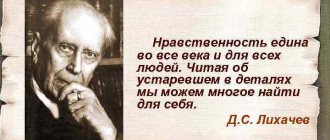RUSSIAN SONG - THE SOUL OF THE PEOPLE
Our Mother Russia is truly rich in talents, the pavements can be paved, but one problem is that they can rarely be heard, because... real art, Russian song has been replaced by foreign cheap fakes, false culture. But the song, like the Russian soul, cannot be destroyed; it glows like an unquenchable candle in its native hinterlands, like a lamp in front of an icon, protecting its true faith, its culture from unkind glances
* * *
Why, when we hear our native speech, the intonations of a Russian song, a painful and inexplicable sadness appears in our soul, and at the same time an amazing feeling of peace in our soul? What is the mysterious power and charm of folk song?
Everything is very simple. The intonations of a Russian song - the intonations of the Russian people - are the voice of the Motherland, the voice of the mother, the voice of our heart.
Popular wisdom says: “The soul of the Russian people lives in a Russian song.” Russian song is a unique, original cultural monument. The basis of a folk song is, first of all, its high spiritual orientation, which contains the natural wealth of the Russian land, characteristic features, traditions of Russian life, and most importantly, the correct religion.
Russian song is the source, the carrier of culture, the basis of all musical genres. It is no coincidence that the Russian composer, founder of Russian musical classics F.I. Glinka emphasized that “Music is created by the people, and we only arrange it.”
Some Russian songs have come to us from ancient times. Having traveled a centuries-long path, the song often lost its author and acquired truly folk features, becoming the property of all Russian culture. But fortunately, some songs have retained their authorship to this day : “The bell rattles monotonously” - I. Makarov, “Varyag” - Y. Repinsky, “Evening ringing” - I. Kozlov, “Luchinushka” - N. Panov. But, despite this, all these songs have one common definition, close and dear to our hearts - Russian folk song.
The song culture is infinitely rich and multifaceted. Let us remember how a Russian song lovingly sings about our native side, about a dark night, about a beaten path infinitely close to us with a mournfully lonely sounding bell and the aching song of the coachman.
With what sorrow and sadness the people sing about the hard lot of women, about the lot of a widowed soldier, about that lot that matches our Mother Russia ( “Mother”, “Luchinka”, “Oh, you widow ”, etc.)
Oh, you, bitter fate - splinter,
The girl's beauty is crying in the field,
Like a woman’s share - destiny
I took it from my mother from Russia.
And vice versa – infectiously cheerful, witty, dancing and comic songs are another facet of the folk character.
Let us remember how the Russian people in folk songs say goodbye to the whole world before death. Here the picture of the highest morality appears before him. In the last minutes of his life, he does not curse fate, but calmly surrenders to the will of God, asking everyone for forgiveness, bowing to his parents, and his last will to his wife, so that she does not grieve and gets married to another, letting her go in peace and love, blessing her new life. Thoughts not about oneself, but about loved ones, are a striking example of the highest moral purity, the inseparability of the life of a Russian person with Christianity, an example of the fact that Russian song is a spiritual reflection of Orthodoxy in Rus'.
And most importantly, Russian song is a living testimony of historical events of different eras.
This is a kind of chronicle preserved by people's memory. Folk epic ballads and rune legends recreate pictures of hoary antiquity, the greatness and heroism of the people. Songs about the great Russian victories, about our grandfathers, the descendants of Russian heroes, raise the spirit of the greatest patriotism of the people, who feel the inextricable connection of their past with the present ( “Varyag”, “It happened near Poltava”, “Susanin”, “Soldiers - children”, "Ermak " etc.)
Russian song is a living confession of our people. It reflects not only the positive features of the Russian spirit, but also truly historical events, sometimes deeply negative. Songs such as “Because of the Island to the Rod”, “Dubinushka”, “Khaz Bulat the Daring”, “Alexandrovsky Central” - speak about the complex, long-suffering fate of Russia. They openly confess the most terrible, deadly sins - murder, paganism, freethinking, apostasy, regicide:
But the time will come and the people will wake up, There are big criminals
He will straighten his mighty back. They didn't like the law
And against the bar, against the king, against the priests and gentlemen, And they stood up for the truth
He will find a stronger club. To destroy the royal throne.
"Dubinushka" "Alexandrovsky Central"
But, we must pay tribute, there are few such songs. After all, the ideal of Russian song has always been the desire for holiness. Russia is a country where people lovingly call their homeland holy - “Holy Rus'!”
They are destroying holy Rus', take your horse,
I don’t have the strength to control myself: What’s not better,
The heat of abuse in the blood is burning, You run, run, mother,
The heart is asking for a fight! To Holy Rus'.
“Let us remember, brothers, Rus' and glory” “Like across the river, and beyond Daria”
The musical basis of Russian folk songs are spiritual chants and ancient znamenny chants. This once again emphasizes that the foundation of the great Russian culture lies in Christianity - the Orthodox faith of our ancestors.
Spiritual Znamenny chants are monophonic singing. Gradually, Russian song developed on their basis a deeply original type of polyphony, subvocal polyphony, where one voice is picked up by another, another by a third, and in its development each goes its own way, as if living through a melodic fabric reminiscent of magnificent Russian lace patterns.
In the original harmonic sound of the diatonic mode of the Russian song, we hear the features of the Russian character. There is no fuss or pettiness in a folk song. Everything is thorough there. In the modal basis itself lies archaism, depth, steadfastness, and restraint. A huge, powerful internal spiritual force underlies the Russian song, which, at the same time, is distinguished by its special melodiousness and melody. The amazing melody reveals all the natural beauty of Mother Russia, her expanse, breadth, purity and sincerity of the soul of the Russian person.
A special distinctive feature of Russian songs is the lack of aggressiveness. Since ancient times, Russian people, the Slavs, have been engaged in peaceful pursuits - agriculture and cattle breeding. He is not a conqueror, but a protector, this has always been the case:
“Let us remember, brothers, Rus' and glory,
And let's go destroy the enemies.
Let's defend our country
Better death than living in slavery."
(“Let us remember, brothers, Rus' and glory”)
The Russian people are proud of their songs and sing them with great love in their folk art:
How it will tighten, how it will flood
Songs of the Russian people,
And where does everything come from?
It goes straight to the heart.”
("What kind of songs")
What power, gigantic strength, and at the same time openness. This is not bragging, but a great love for one’s Russian culture. It is no coincidence that Russia is now experiencing enormous confrontation. The anti-Orthodox forces of the West and the whole world are aimed at destroying Russian culture. The power of Russia is feared, the mystery of the Russian soul is incomprehensible. After all, behind it lies the depth, the hidden, which was nurtured and defended for centuries by our ancestors - this is the true Orthodox faith. In fact, only Mother Russia remained the custodian of the Orthodox faith throughout the world.
Russia cannot be taken in open battle; it immediately becomes an irresistible shield. Now everything is done quietly, without fighting or fighting. Putting on a friendly guise, through the media and sects, an alien ideology is being introduced into Russia. The main goal is the destruction of Orthodoxy through Russian culture. Through the media, sects, alien ideology is being introduced into Russia. By spreading your false culture, i.e. Trying to subjugate the Russian people, the West replaces true concepts.
That’s why you rarely hear a real Russian folk song in its true sound now. And what we hear is somewhat staged, cheerful, non-committal urban modern folklore, where there is very little of Russian song present. If we hear our favorite songs, it is in a completely mutilated form, processed with modern aggressive rhythms that are deeply alien to the chant of Russian melody. These are crippled songs, where the wide length of the Russian song must be adjusted to the clear rhythm of the so-called “freedom”.
I'm not even talking about the fact that they are trying to mix Russian songs with Negro rhythms and tunes, which is completely unacceptable, not to mention the purely external appearance, the “Russians” painted with gold patterns, the costumes of young performers that barely cover their nudity.
It is shameful and painful to hear the song “Evening Bells” - a symbol of Russian culture in a completely distorted form, in the form of an agony dance. It’s a shame for our pop superstars, who, through their own misunderstanding, are destroying Russian culture with their own hands.
Russian song is the voice of the people and it is not so easy to subjugate. And if there are such open attacks on the song, then this only emphasizes its highest spirituality.
The folk song has not only been preserved, but is also developing. Deep bow to our wonderful performer Nar.art. Russia L. Zykina and L. Strelchenko and others. Who truly cherish and keep in their hearts the true sound of Russian songs. Our Mother Russia is an inexhaustible source of folk art. It is gratifying that in our time new songs are being written that preserve everything that Rus' has preserved for centuries. These are really clean springs. How I want them to gurgle with a cheerful din and illuminate the Russian land with their bright streams. They washed away all the dirt, the Western alluvial culture that had scabbed its way into the native land, into the souls of the Russian people.
Russian song is the living creativity of the Russian people, and as long as it lives, our great Russian culture will live.
And everything that is happening now - outside of true culture - is a conscious action to discredit the great real art, which gives the true light of the soul. Trying to block the sun, they themselves find themselves in the shadows. This is a mouse fuss, a weak attempt to bite one’s own tail, since Russian song, like the Orthodox faith, cannot be desecrated!
Irina Skorik, St. Petersburg, 2001






